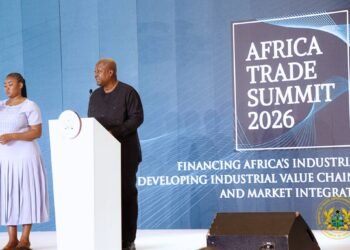Ghana Stock Exchange (GSE) and Botswana Stock Exchange (BSE) are expected to kick off Phase 2 of the African Exchanges Linkage Project (AELP) early next year as the African cross-border digital trade initiative goes live.
Through the coordination of the exchanges and the African Stockbrokers and Securities Dealers Association (ASSDA), each exchange will connect five stockbrokers or securities dealers to the AELP Link. In the first phase of the project 33 stockbrokers have been connected.
The AELP, a flagship project of the African Securities Exchanges Association (ASEA) and the African Development Bank (AfDB), aims to integrate African capital markets by facilitating cross-border trading and free movement of investments on the continent through the AELP Link platform.
The AELP Phase One Is funded by a grant from the Korea-Africa Economic Cooperation (KOAFEC) Trust Fund managed by the African Development Bank.
For evidence of how far inter-African digital finance has come in recent years, one probably needs to look no further than the African Exchanges Linkage Project (AELP), which went live on cross-border trading at the mid-week.
The Exchanges Participating in Phase One
The seven exchanges participating in Phase One of the AELP are: Bourse de Casablanca, the Egyptian Exchange (EGX), the Johannesburg Stock Exchange (JSE), the Nairobi Securities Exchange (NSE), the Nigerian Exchange Limited (NGX), the Stock Exchange of Mauritius (SEM) and Bourse Regionale des Valeurs Mobilieres (BRVM), which brings together a number of exchanges in francophone West Africa.
In July 2021 ASEA signed a contract with financial technology company DirectFN for the design and implementation of the AELP Link trading system in the seven markets. The Link, which is hosted on Oracle Cloud Infrastructure (OCI), has been designed to integrate with exchange and broker trading systems, and is available in English, French and Arabic. It aggregates live market data from the exchanges and enables brokers to access information and see the market depth and liquidity of the foreign market of interest.
The AELP test environment has been operational since July 2022, enabling the stockbrokers and securities dealers to familiarize themselves with the platform and execute mock trades. This culminated in the completion of the User Acceptance Testing on 7th November, 2022, paving the way for the technically to go live this week, November 23, 2022.
The participating stockbrokers have already embarked on signing counterparty broker agreements between different markets. The sponsoring stockbrokers enable access to their domestic markets to sponsored stockbrokers from other markets and vice versa.
The sponsoring broker will clear and settle trades in the host market using their local currency in compliance with the host market’s rules and practices.
Future phases of the project may include automated cross-border payment systems, participation of additional ASEA member exchanges and their respective brokers and additional brokers from the current participating exchanges after the pilot phase.
In the face of the foregoing, one will ask, is this a new dawn for African trade? The perfect answer is though it’s early days yet, the signs so far are promising.























